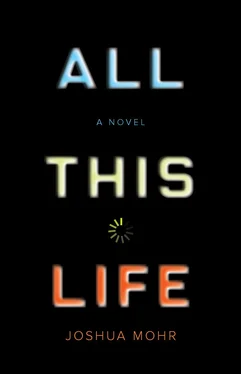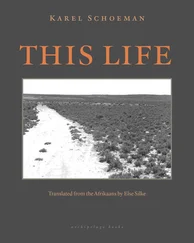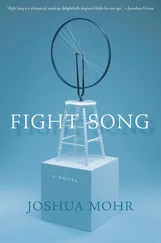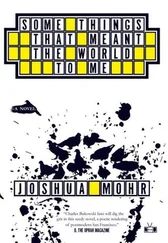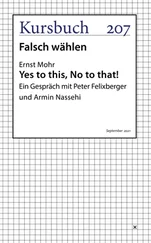The bartender hasn’t put the drink down in front of her yet. There’s time. There’s time to walk away, Kathleen. Go to a meeting. Tell them what happened and let their empathy wash over you. Be around other people who have disfigured their lives, amputated all kinds of happiness. They’ve died in a million ways and glowed electric with embarrassments and somehow lived to tell. Let them talk you out of this. Let them say Don’t give up .
She hates that she’s so easily rattled. That she’s fragile. She thought her years in the program and working the steps would have given her the tools to deal with life when it reaches out and calls you a cunt, but here she is, one syllable from Felix, one phone call, and now she’s watching the bartender put a shot of Old Crow down in front of her.
“Six bucks,” the bartender says.
Kathleen throws down ten and tells her to keep the change.
She’s alone. She has a picture of her son in her pocket, the boy she’ll never see again. She has a caricature of the girl with the black eye and her hopeful baby. She has bourbon in front of her. She has a hand for grabbing the glass. She has a mouth and a tongue.
She should have stayed in the tattoo shop. With Deb. She should call her, text her; she should say, “I’m about to do something dumb,” giving her sponsor the opportunity to crank some clarity. She should shove herself onto her feet and flee outside and ask the gypsy, “Will I ever see him again?”
She should do any of these options, but she can’t.
She’s trapped in the bourbon’s gravitational pull. It’s too close to her, or she’s too close to it. There’s no escape. She can feel her head being yanked toward the bar. She can feel her hand clutching the glass, can feel the bourbon reaching her face, the smell of it making her salivate. She can feel the shot pour over her teeth, puddle at the back of her throat, and she swallows, welcomes it into her system. She can feel her mouth moving and telling the bartender, “One more.” She can feel the lid of a coffin close, blocking out the awful light of the world.
Noah911 had imagined Tracey’s funeral being the worst part of the trip — he’d pictured the whole parish casting eyes his way — whispers of the absentee brother, her bodyguard. He even conjured some confrontations after the service concluded: a couple people hopped up on the amphetamine of grief, unable to keep their heartache stowed away, telling Noah911, “We know this is your fault! We all know you did this!”
But truthfully, the whole visit has been a series of escalating invasions. It started at the airport. His mother picked him up and started crying as soon as she saw his beaten-up mug.
“Oh, sweetie, are you okay?” Her hands rushed up to his face, almost touching him, stopping a few inches away, like he was a dish fresh from the oven.
His body felt devoid of moisture. He was arid and achy and tired. He’d flown from San Francisco to Chicago, then after a three-hour layover, from 2 AM to 5, he’d taken the first flight of the morning from O’Hare to Little Rock.
“What are you connected to?” he heard the gate agent say in Chicago. But that couldn’t be right. No doubt he had a concussion. His nose was broken. He knew at least one rib was fractured, knew that agony from a lacrosse check years back. He knew that breathing would be anguish, like it should be.
“What did you say?” he asked the gate agent.
“Where are you connecting to?” she said.
“Arkansas.”
After an hour and forty-four minutes in the air, he arrived at Clinton Airport, stood in front of his mother as she took stock of his damaged face.
“Where’s Dad?” he said.
“At home.”
“Of course.”
“Can I carry your bag?” she asked.
“Of course you can’t,” he said.
They didn’t talk much as they walked to the car, or during the thirty-minute drive home. They didn’t speak because there was nothing to say, and if there were, the words would only slide him back in the oven, baking Noah911 to ash.
His father didn’t meet him outside, or at the front door for a greeting. His dad didn’t seek him out as Noah911 entered his old room. It was the son who had to find his father, who was in Tracey’s room. Or what used to be Tracey’s room. Now, it looked staged, a fake room set up at IKEA to give consumers an idea what the furniture would look like in a home. The yellow paint on the walls was fresh, making the space smell sour. The carpet had been ripped up for hardwood. There was a desk, stained deep brown, with nothing on it. A big shelving unit was situated against the wall, its doors open, not one thing inside. The only other item was a potted plant with a braided stalk; it was young, only a few leaves, too small for the size of its pot, plenty of room to grow.
The father sat on the floor assembling a leather chair, the instructions splayed on his lap. “These directions are horrible.”
“What’s all this then?” Noah911 said.
“Your mother’s new crafting studio.”
Noah911 didn’t enter the room, standing in the doorway. No one said hello. No one offered a hug. It was a father trying to understand instructions; it was a son trying to understand, too.
“Crafting?” Noah911 said.
“Arts and crafts.”
“I’ve never seen Mom make an art or craft.”
“She’s wanted to for years.”
“Has she?”
His father looked up from the directions. “She has.”
“I’m going to take a shower,” Noah911 said, turning to leave.
“You don’t look as bad as I thought,” said his father. “I’m glad about that.”
“These things heal.”
“The service starts at noon.”
“I know.”
“How am I supposed to even make sense of this?” his father said, eyes back on the instructions, fumbling to attach one of the chair’s wheels.
Noah911 went back into his room, started to unpack his clothes. His mom entered with a steaming cup of coffee. “You’re an angel,” he said, then felt stupid for his choice of words. He had a sip; it was thin and weak.
“Will you need anything ironed?” she said.
“I can do it.”
“I’d like to.”
He knew better than to fight her on things like this. “Okay.” He handed her a button-up shirt and slacks, both black.
His mother pursed her lips, inhaled to say something, but didn’t.
“I saw your crafting studio,” Noah911 said.
“There’s a fresh towel in the bathroom.” She left the room.
•••
THE FUNERAL WASa fist. It had tear ducts. The funeral was held in a lung, clammy and loud with mourners plucking clumsy ballads on heartstrings and razor wire. Grief felt tight to the body, like a wetsuit, squeezing Noah911’s anatomy into a tangle of pall and regret. He could smell this funeral a mile away, pungent with feral, barnyard odors. People sat on platitudes with prayers that sounded like this: Why why why, Noah911? or a slow gurgling croon of No no no. .
Everyone was numb and drunk.
Everyone was alive and dead.
And Noah911 was having trouble breathing from the broken rib. He was alone, might as well have been on a witness stand, everybody else jammed in a jury box, the minister banging a gavel on his Bible and belting out, “Guilty, Guilty, Guilty!”
THERE WAS Areception afterward. Platters of deli meat and bottled beer, homemade cookies and condolences. Noah911 was avoiding people, or they steered clear of him. It was his beaten-up face, his rumpled blazer. It was a two-day-old shave. It was nothing.
He watched people rally around his mother and father, watched all the pity and sympathy being expressed. He stood in a corner trying not to get wasted, hadn’t eaten since a pastrami sandwich in O’Hare and this first vodka on the rocks went straight to his concussion.
Читать дальше
